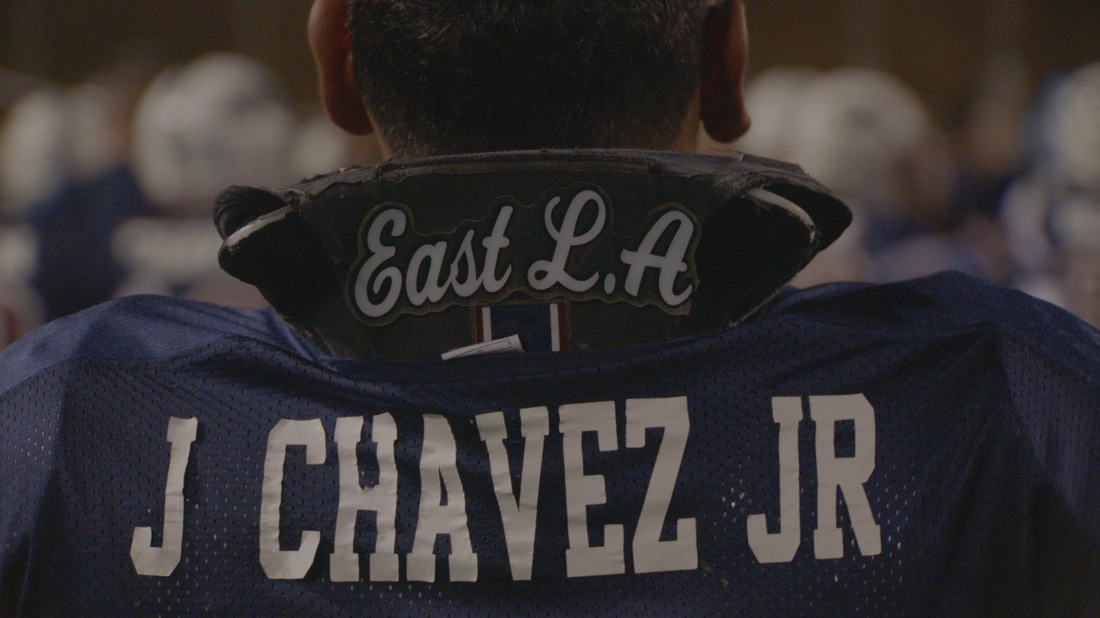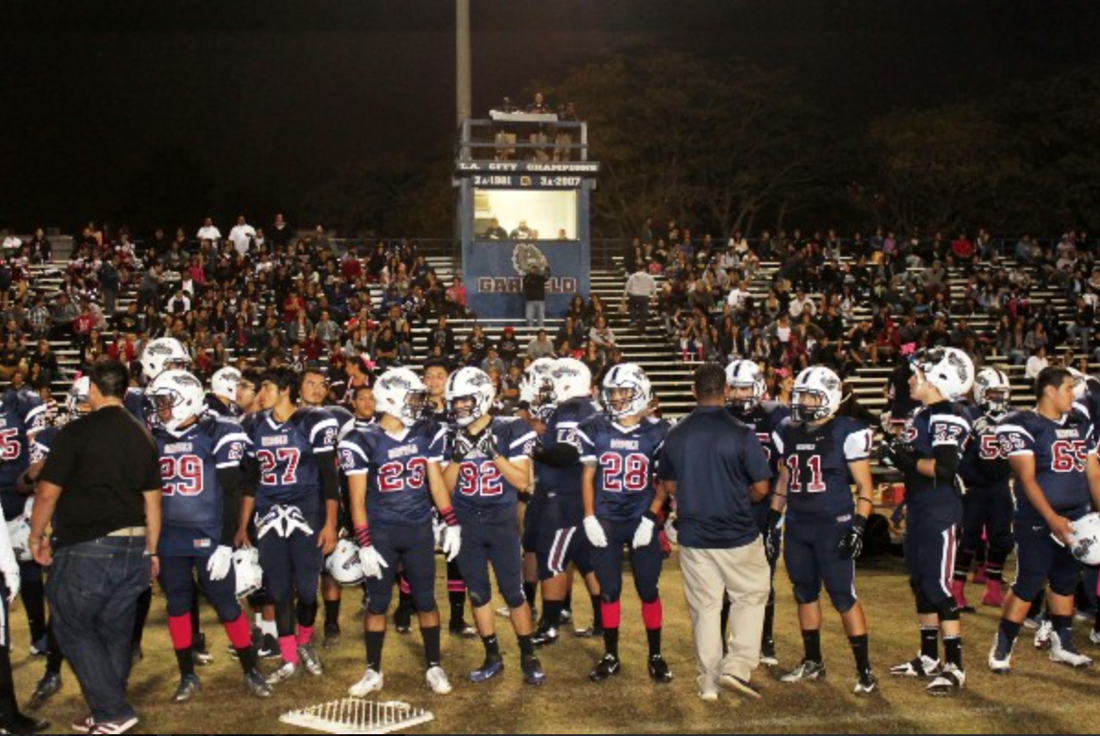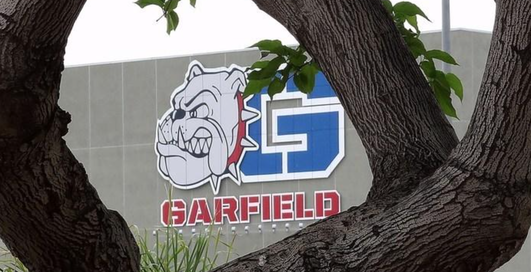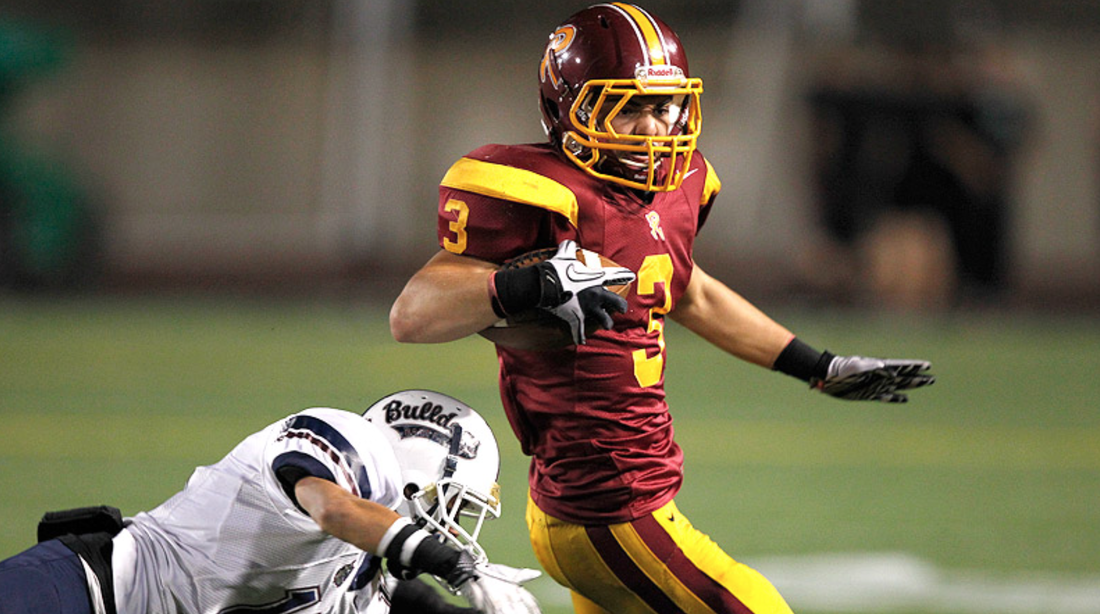|
Billy McMillin makes directorial debut with story of Garfield vs. Roosevelt High: 'You don't typically do a sports film where you're rooting for both sides'
Update: The Classic wins storytelling award from LA Film Festival
For many years I've done volunteer tutoring in East L.A., so when I heard the LA Film Festival would be premiering a documentary that centers on the community it came as exciting news.
And what a film it is. The Classic takes viewers inside the intense football rivalry between two East L.A. high schools -- Garfield and Roosevelt -- that culminates each season with the "big game," a contest that typically draws upwards of 25,000 fans. First-time director Billy McMillin sees The Classic not as a 'sports film' per se, but a broader portrait of a majority-Latino part of the city that is often overlooked. "The Classic was a way in to a community. It was a way I thought I could get audiences that wouldn't normally relate with this community to relate, to open themselves up to this story, to see this community as American as their community is," McMillin explained in an interview at Delirio Films in L.A. "It's a multi-layered story." THE CLASSIC | TRAILER from Delirio Films on Vimeo.
The Classic reveals the overwhelming pressure faced by Garfield and Roosevelt coaches and athletes to defeat their rivals and claim the cross-town title.
"It's a big deal in the community," McMillin said. "The game's been going on since 1925 and only took a few years off for the war. At the time that I filmed it it was the 80th annual game... Over the years it's grown substantially." The pressures experienced by the players extend well beyond the football field. They come from families struggling to makes ends meet, and some deal with the worry of what may happen to undocumented loved ones. Hanging over the kids, and the community, are the politics of immigration, issues of inclusion and isolation, and who qualifies as American. "That was the backdrop [to the film] that I saw from the beginning, and the reason I wanted to tell this story," the director told me. To establish the larger context McMillin weaves in audio clips from talk radio programs where some people assail Mexican immigrants as a blight. "People do, on this issue, really do get set in their camps, and do have a tendency to view people who are against what they think [as the enemy]," McMillin commented. "They want to see them just as an 'other.'"
Four players became McMillin's central focus:
Joseph Silva/Garfield Sophomore "He's a middle linebacker for the Garfield Bulldogs. At the time I met him he was a sophomore and already had a 1-year-old baby. He is a kid from a pretty broken family, dad who was in and out of jail most of Joseph's young life and mom who was never around, a drug addict that was never a structured part of Joseph's life. "Football is his outlet... It's getting to hold on to childhood in some sort of way. He's a kid that's growing up way too fast. I found that a common theme in the neighborhood."
Mario Ramirez/Roosevelt Senior
"He's a wide receiver. He's also the punter. He's a field goal kicker at some point. Very athletic kid. Very handsome guy. He's got almost a perfect grade-point average. On the surface it looks like Mario has it all but what you find out is that he lives in a mixed-status family. Part of his family is undocumented. He lives in a house with 14 people. He comes from extreme poverty."
Sammy Hernandez/Roosevelt Senior
"Roosevelt's quarterback. He's a handsome kid, dad's a cop, mom works for the schools. He's dealing with that issue of assimilation that's present in this community. Sammy's becoming more American. He's starting to lose his Mexican heritage... Yet his community is so important to him. He's the quarterback. He's got the weight of the community, with this big game, on his shoulders."
Stevie Williams/Garfield Senior
"Stevie's an African-American kid from South Central. His mom was basically his only parent because his dad had been in jail since Stevie was really, really young. Stevie was bused over to the school at a time when Garfield started bringing in some kids from outside the neighborhood, which had never been done before up until a few years ago. That created a lot of controversy. "It created what we see on a macro level with immigration -- where people are worried about outsiders coming in. It created that same sort of dynamic in the reverse in this community. Yet Stevie is as empathetic a character as anybody could hope for. He's a humble kid who just wants to help his mom out."
"I feel like I really lucked out with these four characters," McMillin told me. "You don't typically do a sports film where you're rooting for both sides. That's unheard of... It makes filmmaking really challenging... [Originally] I had more characters but I really had to hone it down so that you could really empathize with these characters. Ultimately what you were hoping for -- on and off the field -- is for these kids to succeed and to strive and to 'leave it all on the field,' as they say."
McMillin said it wasn't easy to convince the L.A. Unified School District (LAUSD) to give him the access necessary to make the film.
"It was tricky. We had to earn LAUSD's trust," McMillin acknowledged. "They were worried that we would come in and that we were going to do something that was a hit piece on their schools that would be trying to shine a light on dropout rates or something like that... We had to kind of make friends on the School Board [and convince them] that we were doing something that was noble."
The film's world premiere drew an enthusiastic crowd where the rivalry -- perhaps for a moment -- could be set aside.
"That's the most rewarding part of this whole equation, is debuting the film here [at the LA Film Festival]. The premiere audience was largely an East L.A. audience, the audience that I was most worried about showing it to in the first place," McMillin said. "And to see them really embrace the film and afterwards to hear them say we did an incredible job telling their story, was fulfilling in so many ways." The director said distribution plans for the film are still in the works. "We are trying to sell the film to whatever places we can," McMillin noted. "Ultimately I want the film to be as successful as possible, so we're going to try to seek the best distribution deal that gets the film in as many venues, as many households as possible." Update: The LA Film Festival announced its awards on Thursday, honoring The Classic with a special mention for "excellence in storytelling." |
AuthorMatthew Carey is a documentary filmmaker and journalist. His work has appeared on Deadline.com, CNN, CNN.com, TheWrap.com, NBCNews.com and in Documentary magazine. |
- Home
- News
- Videos
-
Galleries
- 2019 Tribeca Film Festival
- Full Frame Documentary Film Festival
- 2019 SXSW Film Festival
- SXSW 2018 Gallery
- 2019 Sundance Film Festival
- Outfest 2018 Photo Gallery
- Outfest 2017
- Sundance 2018 Photos
- 2017 LA Film Festival
- 2017 Cannes Film Festival
- Tribeca Film Festival 2017
- SXSW 2017 Gallery
- 2017 Berlin Film Festival
- Sundance 2017 Gallery
- 2016 Los Angeles Film Festival
- Cannes Film Festival 2016
- SXSW 2016 Gallery
- Berlinale 2016 Gallery
- Sundance 2016 Gallery
- Filmmaker Gallery
- About
- Contact
Proudly powered by Weebly
- Home
- News
- Videos
-
Galleries
- 2019 Tribeca Film Festival
- Full Frame Documentary Film Festival
- 2019 SXSW Film Festival
- SXSW 2018 Gallery
- 2019 Sundance Film Festival
- Outfest 2018 Photo Gallery
- Outfest 2017
- Sundance 2018 Photos
- 2017 LA Film Festival
- 2017 Cannes Film Festival
- Tribeca Film Festival 2017
- SXSW 2017 Gallery
- 2017 Berlin Film Festival
- Sundance 2017 Gallery
- 2016 Los Angeles Film Festival
- Cannes Film Festival 2016
- SXSW 2016 Gallery
- Berlinale 2016 Gallery
- Sundance 2016 Gallery
- Filmmaker Gallery
- About
- Contact







 RSS Feed
RSS Feed